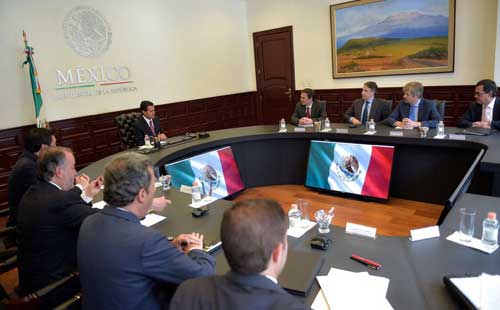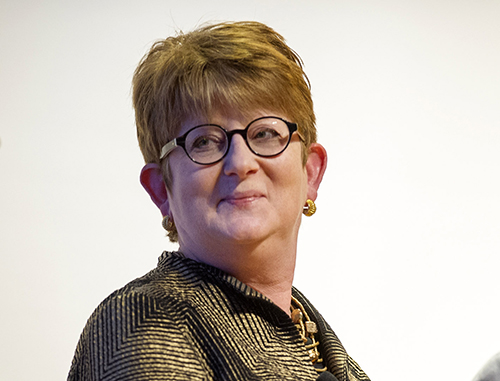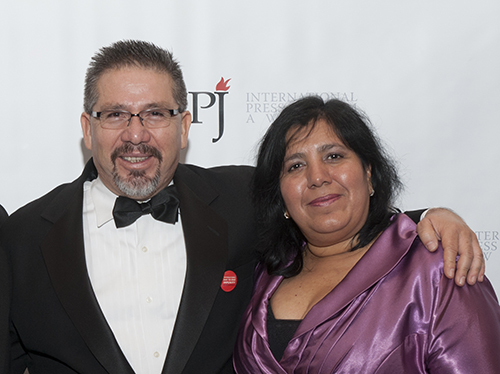Days after Mexican president pledges to combat impunity, local journalist killed
On May 4, a CPJ delegation visited Mexican President Enrique Peña Nieto as part of a mission to launch a special report, “No Excuse,” which calls on the government to do more to bring those who murder journalists to justice.
During the 90-minute meeting, Peña Nieto told CPJ that his government was committed to following up on investigations into attacks on the press and pledged to prioritize combating impunity in the murders of journalists for the remainder of his term. He said the safety and protection of journalists would also be a priority and guaranteed to fund for a federal protection mechanism which would have run out of money in October.
The CPJ delegation was made up of Carlos Lauría, CPJ’s program director and senior program coordinator for the Americas; Jan-Albert Hootsen, CPJ’s Mexico correspondent; and CPJ board member Jonathan Klein, of Getty Images.

The CPJ delegation also expressed concern about the poor record of the office of the federal prosecutor in successfully investigating crimes against journalists. Mexico’s attorney general, who attended the meeting, said authorities were “looking to replace” the federal prosecutor “with someone experienced who will have the support and recognition of (freedom of expression) organizations.”
“We were so pleased with the response to the report and the fact that Mexico is beginning to grapple with these issues,” said Lauría. “But the murder of our dear friend and colleague Javier Valdez Cárdenas less than two weeks later showed us just how far we have to go.”
Javier Valdez Cárdenas, a correspondent for the Mexican daily La Jornada and winner of CPJ’s 2011 International Press Freedom Award, was shot dead on May 15 near the offices of Riodoce, a local weekly he founded in 2013. Valdez covered crime and drug trafficking and wrote several books about the drug trade. In the weeks before he was killed, he told CPJ he was concerned for his safety.
Valdez is among four journalists CPJ has documented as having been murdered in relation to their work in Mexico in 2017. Since 1992, when CPJ first began keeping records, nearly 40 have been targeted for murder.
In a moving tribute to Valdez published in The New York Times, Lauría reflected on the challenges the journalist faced in reporting from Culiacán, the capital of Sinaloa state. “We are testing limits every day,” Valdez once said. “It’s as if we have been trained to do journalism in the midst of war.”
CPJ’s former Americas research associate, Sara Rafsky, also wrote about how Mexican journalists must now “endure the loss of one of the braves and most beloved of their resilient pack.” In his 2011 IPFA acceptance speech, Valdez said, “Where I work, Culiacán, in the state of Sinaloa, Mexico, it is dangerous to be alive, and to do journalism is to walk on an invisible line drawn by the bad guys in a field strewn with explosives.”
CPJ speaks out about press freedom in the US
As the threats to press freedom in the United States continue, CPJ continues to advocate on behalf of journalists working in the country.
On May 3, World Press Freedom Day, Simon was invited on to Christiane Amanpour’s show on CNN, where he spoke about the global fallout from President Trump’s efforts to attack the media. He then went on “PBS NewsHour,” where he discussed how a critical voice was missing in the fight to uphold press freedom–that of the United States. In mid-May, before Trump met with Turkish President Recep Tayyip Erdoğan, Simon wrote in his column for the Columbia Journalism Review that Trump’s “embrace of the world’s leading press freedom violators is serving to normalize media repression.”
CPJ has also been quoted in the Guardian, Poynter, and The New York Times about Trump’s rhetoric having a chilling effect on the work of journalists in the U.S. and abroad. CPJ representatives have been interviewed by CNN’s Brian Stelter, CBS News, and Voice of America about threats to journalists in the country. In an op-ed for The Washington Post, CPJ staff described how the rapid decline in press freedom in countries around the world often takes place in stages. “As the president of the United States, Trump is responsible for upholding and defending our political values and the constitutional principles at the heart of our democracy,” the op-ed reads. “Let us hope he can find his voice.”
Please continue to support CPJ’s work by clicking here to make a monthly gift. Thank you!
Tweet: Without a free press, few other human rights are attainable. Support CPJ today!
Must-reads in May
In the run-up to elections, Iranian authorities have often cracked down on the independent media. This year, as Iranians prepared to vote in presidential and city council elections, the government arrested several administrators of the Telegram app, a popular tool for Iranians to share news. As one Telegram administrator said, “Telegram was the deciding factor in Iran’s last election, and I believe it will play a very important role in the upcoming presidential election.
A blog post by CPJ’s executive director, Joel Simon, and CPJ’s senior U.S. research associate, Alexandra Ellerbeck, called “With press freedom under attack worldwide, US is setting wrong example,” explores how words or actions by U.S. leaders embolden repressive leaders around the world who defend their restrictions on a free press by citing Western governments as examples. President Trump, they wrote, has expressed no such interest in upholding press freedom in the United States. At a rally in Pennsylvania, he called the media a “disgrace” and deemed journalists “incompetent, dishonest people.”
A blog post, called “Families of jailed journalists in Egypt await outcome of latest trials,” by CPJ’s Middle East and North Africa intern, Marwa Morgan, highlights the struggle undertaken by the families of jailed Egyptian journalists. “The letters help, but nothing is ever enough,” one journalist’s brother said. A bit of good news: A week after Morgan’s blog was published, two journalists were acquitted and the sentences of three others were reduced in a retrial.
CPJ welcomes new board chair

On May 25, CPJ welcomed Kathleen Carroll as its new chair of the board.
Carroll joined CPJ’s board in 2008 and has served as the vice chair for the past five years. From 2002 through 2016, she was executive editor and senior vice president of The Associated Press, where she was responsible for content in all formats from the journalists based in the AP’s 243 bureaus in 97 countries around the world. Carroll first joined the AP’s Dallas bureau in 1978, after working as a reporter at The Dallas Morning News.
Welcome, Kathleen!
CPJ in the news
CNN “Reliable Sources”: Physical attacks on journalists
The New York Times: Rough treatment of journalists in the Trump era
Columbia Journalism Review: Trump gets cozy with the jailers of journalists
Poynter: In a private meeting, President Trump allegedly urged Comey to imprison journalists
The New York Times: “To die would be to stop writing”
Telesur TV: On World Press Freedom Day, Mexico is still failing its journalists in face of deadly violence
The Washington Post: In Mexico, journalism is literally being killed off
The Washington Post: The most common punishment for killing a journalist in Mexico: Nothing
Radio Free Europe/Radio Liberty: Russian journalist, Putin critic dies after severe beating
The Hill: Czech president’s joke about journalists no laughing matter
